- Home
- Lincoln Cole
Ripples Through Time Page 20
Ripples Through Time Read online
Page 20
“The ‘keep…Portia…fed’ cause? I spent all my money on textbooks and that museum trip I was telling you about. And I also bought mom’s birthday present.”
“What did you get her?”
“Well Quincy and I got her a picture frame. The ones that scroll through boring family photos and play sappy music in the background. She can put it on the night stand or something. What did you get her?”
“Nothing yet. I was thinking about an IPAD.”
“Oh, that’s a great idea! And I’m sure that if you both put your minds together and work really hard at it, you might figure out how to turn it on!”
“Har har,” I reply, smiling. “Maybe you could teach her how to use it.”
“I could, maybe,” she says, “if I had money to incentivize me. Seriously dad, I’m like literally starving to death up here.”
“Fine. You still have the credit card?”
“Yeah, emergencies only.”
“Let’s go ahead and call this an emergency. Two hundred. No more, got it?”
“Two hundred. Deal.”
“I’d come by and drop some off, but I’m in the middle of something,” I say.
“It’s fine. It’s actually kinda better this way. For me at least.”
“But this way I don’t get to give you a hug and embarrass you in front of your friends.”
“Exactly. Better. Thanks dad, you’re the best.”
“Stay safe pumpkin. Oh, and since I apparently have to buy your love, how long is this going to get me?”
“Uh, let’s call it a week,” she says with a laugh. “Maybe ten days.”
I chuckle. “Love you,” I say. “Stay safe.”
“Love you too,” she says, hanging up. I never thought I could miss anyone as much as I miss my daughter now that she’s off at college. When Quincy left it was rough, but Portia means more to me. She’s my little baby girl, and she’ll always be my sweet innocent child (no matter how hard she works to be otherwise). Quincy was always closer to his mother, but Portia was a daddy’s girl all the way.
I flip back to the text messages. My wife receives a reply from me that reads simply: ‘chicken?’ and then I check the text from Bethany. She is worried about the phone call she got earlier from Calvin, but she was too distracted by everything at work to take it seriously. Calvin basically told her ‘goodbye,’ and Bethany took that to mean he wanted to get rid of the condo. She is, in fact, pissed at him that he is thinking about moving again. She knows how much he hates the place (almost as much as he hates retirement homes).
And Bethany can’t imagine he could have meant anything else. Her mother hasn’t been buried for more than a week. The grave is still free of grass and weeds. The thought of losing her father as well is simply unreasonable. Unfathomable.
But Calvin is fathoming it. I understand that when Calvin says he will end his life with or without my help he is serious. What I should do, I know, is report it. Call Bethany, explain the situation, and then help find him someplace safe. A nice retirement home to live in that will take care of him and protect him. Protect him from himself.
But I don’t type out any message. At least not right away. I just stare at Bethany’s text—‘how’s he doing?’—lost in thought. I glance at the yard again. The flowers are all blooming in the garden, a variety of colors ranging from deep red to light blue. Bethany has wanted to (and now that Emily is gone, she is seriously talking about) moving Calvin into a retirement home. Somewhere to tuck him away, make him invisible until someone seeks to talk to him. She wants to make him someone else’s responsibility.
But this is his home. This is where his wife died. This is the place he should spend his retirement in. Why should he have to leave simply because no one wants to take care of him?
In human history there are a lot of references to honorable suicide, assisted suicide, or euthanasia. It’s been a way to shed dishonor in both the East and the West. They used to think about it entirely different; they thought that keeping someone who wanted to die alive was only to satisfy the selfish desires of everyone except the person. That makes a lot of sense to me, because we’re the ones left behind when someone dies. We’re the ones who have to live with the hole they left. It should be up to the person, not the people around them: if Calvin wants to make a selfish decision, it’s his to make. Just because we have a stigma against it today doesn’t automatically make it bad.
Don’t get me wrong, I am completely against Calvin killing himself. But not for religious reasons. I don’t think God will smite him or kick his ass out of heaven or anything like that. I just think life is worth living. Everyone deserves to find happiness and no matter how bleak things get, there is always something worth living for. But that’s not an opinion that can be forced. Either Calvin feels the same way or he doesn’t. And if he doesn’t, there’s nothing I can do to change his mind.
If Calvin was seeking help, it would be one thing; if he was scared because of what he was thinking of doing then I’d jump at the opportunity to help him. But he isn’t. The opposite is true: Calvin is adamant that he wants to end his own life on his own terms. He’s made up his mind, and I’m pretty sure that the only difference in whether I told Bethany would be that Calvin would kill himself in a nursing home instead of at his wife’s grave. And wouldn’t it be better for him…
Shit. I force the thoughts away. I can’t even believe I’m fostering them. If I were to knowingly allow Calvin to kill himself, then I might as well pull the trigger myself. It would amount to the same thing. In for a penny, in for a pound.
No, I decide definitively. I can’t be a part of anyone taking their own life. Not even when they feel there’s no reason to keep going. I need to do everything I can to put a stop to it.
Nevertheless, when I finally type out a text message to Bethany, it says: ‘going well. Will update soon.’ It’s a slow process as my thumbs gently press the keys, back spacing often to remove an errant letter. Arthritis makes me wish for the good old days when phones were for talking on, not texting.
When I finally finish over ten minutes have passed. Calvin is taking a lot longer with the tea than I anticipated. I start to stand up to go check on him—not quite fearing the worst yet—when I see the old man tottering across the living room, heading this direction. He has a tray balanced precariously on his arms and looks tired. He always looks tired anymore.
I open the door and move to take the tray. Calvin keeps it out of reach and steps past me, setting the tray carefully on the table. Two porcelain cups from Emily’s collection are on the tray with steaming liquid inside. There is also a manila envelope resting next to the cups.
Calvin hands me a cup, and I take a sip. “What’s in the envelope?”
He waves the question away. “How’s the tea?”
“Good,” I reply. Chamomile, honey sweetened. Emily’s favorite. They probably have boxes of it stashed away.
I take another sip of the hot tea and set it gently on the table.
A barking dog alerts the neighborhood that its owner just got home. When I check my watch I see its afternoon now. Only a few hours left of sunlight before it slips past the horizon. I can hardly believe how fast the day went.
“I’ll still do it,” Calvin says suddenly, breaking the silence. He’s taken out the dentures, I notice. His words are harder to understand, his speaking slower.
“You shouldn’t,” I say, shaking my head and sighing. “I won’t let you, Calvin. I don’t even understand why you would want to.”
“I never said I wanted to,” he replied. “I said I have to.”
“But you don’t have to. Your family loves you—“
“Same argument as before,” Calvin interrupts. “Doesn’t make any more sense now than it did then.”
“Wake up, Calvin,” I say, slamming my hand on the table. “You’re upset that your wife is gone and you’re thinking of doing something stupid. I’m not going to help you.”
“Then don’t,” Calvin s
ays harshly. “It’s only a few minutes’ walk to the graveyard, and I can get there myself. All I’m asking is that you don’t tell anybody for a little while. Just let them find me there.”
“Calvin…”
“You aren’t my wife, Edward,” Calvin says. I fall silent. “So please stop telling me what I can and can’t do.”
I hesitate, not sure what to say. I pick up my tea, blow the steam off, and take another sip. Calvin picks up his own cup now and takes a long drink.
“I’m sorry, Calvin,” I say, “but I still have to tell Bethany. I can’t let you go through with this. Your life will get better.”
“Don’t lie to me.”
“I’m not,” I reply.
“Then don’t lie to yourself.”
“I’m sorry, Calvin, but I’ve made up my mind. I won’t let you do this.”
“I know,” Calvin says. His eyes droop and he half-smiles. I furrow my eyebrows, confused.
“You know what?”
“I was expecting…that…answer…” Calvin says, then takes another drink of his tea. A little bit dribbles down his chin. His eyes pop back open and he points at the manila envelope. “My…will and power…of attorney are in there. And…DNR…”
Calvin takes another gulp of his tea, and suddenly it hits me. “Oh shit!”
I spring around the table and grab the cup from Calvin. His head is drooping.
“What did you take?”
Calvin looks up. “Two…minute drive…to…the…cemetery…”
“What did you—“
It’s useless. He can barely look at me. His eyes are glossed. I rush into the kitchen. The teapot is sitting on the counter, the stove is still on, and on the counter rests a prescription bottle. Seroquel. A sleeping pill they prescribed for Emily. Sixty count.
It’s empty.
I turn off the burner and lean heavily against the counter. The hospital is twenty minutes away. I can call an ambulance, but it would probably just be quicker to drive Calvin myself.
By the time I get back outside Calvin is barely conscious. His eyes are drooping and his breathing is shallow and ragged. I can’t even imagine what effect the drug is having on him.
“Come on Calvin,” I say, shaking his shoulder. “Let’s go.”
I’m not expecting a response but I think keeping Calvin awake is important. Or not. I don’t know. If only my brother Adam were here, he would know what to do.
I kneel down to pick the old man up. He’s so light, even in his layered clothing. I carry him across the lawn to my car, awkwardly opening the door and fumbling Calvin into the seat. I make sure (in what seems a comic fashion) to buckle him in.
I don’t bother locking the house door or checking anything else before climbing into the driver’s seat and buckling myself in. I reach for the ignition and suddenly feel a hand grab my arm. Calvin’s eyes pop open. He is already semi-delirious.
“No hospital!” the old man mumbles. “I’ll just…do it…again…”
Then his eyes slip shut. His breathing is slower now, more relaxed, more disquieting. I sit, hand frozen on the ignition switch, terrified and on the verge of crying.
“Damn it!” I mumble, turning the ignition.
Slowly, my car rolls out of the driveway.
One Week Ago… - Richard Greenwood
Funeral Rights
The ostentatious and elegant lobby of the Parker-Kingston building was packed with dapper, fashionable men and women. The sort of citizens that are conspicuous in a crowd wearing multiple thousand dollar suits. Richard’s kind of people.
Eye contact was exchanged, nods were offered, but barely a word was spoken. The only sounds were the clacking of shoes across marble flooring and the trickling of water down a faux waterfall in the central chamber of the decadent lobby.
Everyone was in a hurry: lawyers always were. Their time was important because they were able to use it effectively. Wasting it was a nearly unforgivable sin. The job was demanding. Only a certain type of person really thrived in it.
Richard was that type of person. He was that type of person in spades. He could handle anything the job threw at him, hitting homeruns on curveballs. If lawyers stood out in a crowd then he stood out in a crowd of lawyers.
And that wasn’t bragging. He wasn’t the type to brag. He just understood the importance of projecting well-earned confidence.
Rick shouldered his way through the milling crowd in front of the elevator. He didn’t have time to wait. He was a fairly big man, well-built and handsome. Part of his appeal was sheer charisma, and the rest was physical attraction. If he knew he was important, then everyone else would as well. He felt it in their lingering gazes wherever he walked. Women couldn’t take their eyes off of him. Men were jealous and deferential.
He rode the elevator and walked into his offices. To his right and left were full length windows showing picturesque views of the city beyond, tinted to keep the sun at bay whilst showcasing the best skyline in the city. It was like stepping into a work of art, beautiful and serene.
And intentional. Follow the left hallway around the corner and find a series of windowless rooms where tired people typed reports and correspondence. The right hallway hid an under stocked break room and maintenance closet.
“Morning, Mr. Greenwood,” Georgia, one of the secretaries, said.
He nodded in acknowledgement, frowning toward the meeting room. “No one is here yet?”
“Um, no,” Georgia said, an uncomfortable look on her face. The way she knit her eyebrows together when she was thinking hard was endearing. “I called Mr. Reddington earlier to—”
“Just send them in when they arrive,” Richard interrupted impatiently, heading for the more extravagant of the conference rooms.
“But Mr. Greenwood I have a memo—”
“Later,” Richard replied. “Add it to my schedule.”
Richard slid smoothly into the office, taking his seat at the head of the table. He set his briefcase down and frowned at the projector mounted into the ceiling. It was turned off.
He’d e-mailed his PowerPoint this morning, which meant they should have had it loaded and ready. It was that kind of oversight and laziness he was coming to expect from the staff. If it were up to him, the IT worker responsible would be fired.
Not that it mattered. Richard could load his own PowerPoint. Hell, a trained monkey could, which is what made the IT department so sad. They didn’t even have a difficult job, yet could barely perform it.
Once he’d gotten the computer fired up and the projector turned on he set about finding the presentation. He navigated to his file, double clicked it, and waited for it to load.
It didn’t. The projector went blue and the screen flashed an error. Richard narrowed his eyes and clicked it again. Nothing, just another error.
He pushed open the door to the conference room: “Georgia?”
She glanced up at him timidly. “Sir?”
“Send in IT.”
“But, sir, everyone is—”
He didn’t let her finish, but let the door swing back closed. She was probably going to tell him it was their lunchtime, and quite frankly he didn’t care.
He tried the file again. It still didn’t load.
“If only it were an Apple computer…” he mused.
After a few minutes the door opened and Georgia stepped lightly into the conference hall. “Sir?”
He scowled. “Where is IT?”
She walked gingerly to his computer and frowned at the screen. “It’s just the—”
“Georgia whatever is wrong with the—”
“Projector needs to be turned to the right HDMI connector and—”
“Stupid computer is something you can’t fix and it’s just a horrible design on Microsoft’s part, because they are a terrible company that—”
“And we just need to…” Georgia tapped a few keys and pressed a button on the table. The image flashed to life, displaying his presentation.
&nbs
p; “Are the others here yet?”
She cringed. “No, sir, they aren’t coming.”
“What do you mean?”
“I mean that after we got the memo everyone decided to postpone the meeting. Out of respect.”
“You mean you let me come in here and set everything up and no one else is even coming?”
Panic entered her eyes. “I’m sorry you just seemed—”
He waved his hand and sighed, rubbing his eyes. “When is later?”
“They’re waiting for you to reschedule,” she said.
“Me? Why?”
“Because of the memo,” she said.
“What memo?”
Her face turned ashen. She rushed back out of the conference room and snagged something off of her desk. Richard frowned at her, confused, as she came back in.
She mumbled something and handed him a memo. Then she disappeared.
He glanced down at the paper and felt the blood drain from his face.
***
Richard rubbed absently at the stubble on his jaw, staring out the windshield at the gathered traffic. Seeing none of it. His mind was on autopilot stuck replaying one event nearly thirty years ago over and over again; a 787 Dreamliner could have landed on the interstate in front of his Lexus and he wouldn’t have noticed.
“…day at least?”
He blinked and glanced to his side. His wife, Deborah, sat there in her modest mourning dress. Her skin was still smooth after all of these years and her eyes still held the same spark, but her hair was starting to turn gray. She dyed it—the wrong shade, she’d admitted to him (he couldn’t tell the difference)—and if he’d never seen it during their morning rituals he wouldn’t have guessed.
The truth was, she appeared ten years younger than her driver’s license would admit to, which simultaneously made her seem young and him feel old. He was, after all, ten years her senior and nearing his fifty-third birthday. Or fifty-fourth. He’d have to ask her to be sure.
She was smiling at him. It was a demure smile, innocent. The smile he fell in love with and made him want to marry her.
Richard must have looked haggard indeed if she was bringing that smile out.
“Hmm?” he replied.

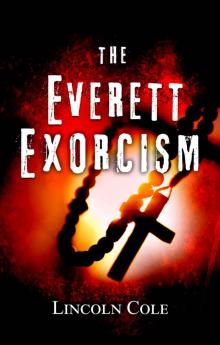 The Everett Exorcism
The Everett Exorcism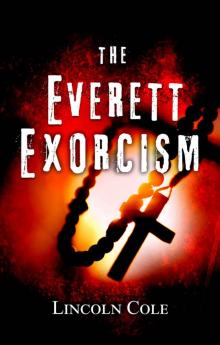 The Everett Exorcism (World of Shadows Book 1)
The Everett Exorcism (World of Shadows Book 1)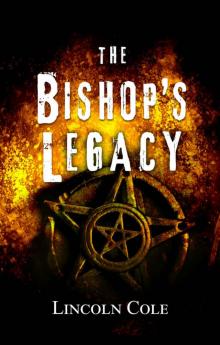 The Bishop's Legacy
The Bishop's Legacy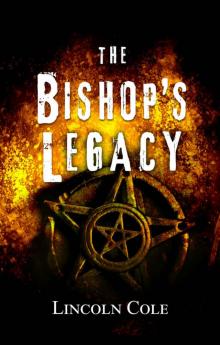 The Bishop's Legacy (World of Shadows Book 3)
The Bishop's Legacy (World of Shadows Book 3)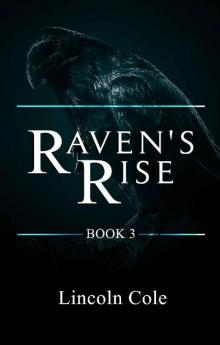 Raven's Rise (World on Fire Book 3)
Raven's Rise (World on Fire Book 3) The Vatican Children (World of Shadows Book 2)
The Vatican Children (World of Shadows Book 2) Raven's Fall (World on Fire Book 2)
Raven's Fall (World on Fire Book 2)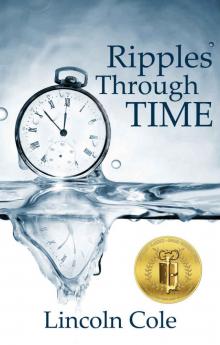 Ripples Through Time
Ripples Through Time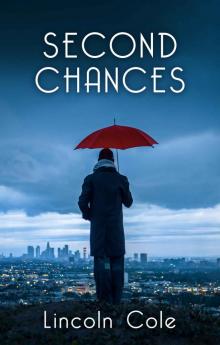 Second Chances
Second Chances Graveyard of Empires
Graveyard of Empires